Related Research Articles

Bernard Cornwell is a British-American author of historical novels and a history of the Waterloo Campaign. He is best known for his novels about Napoleonic Wars rifleman Richard Sharpe. He has also written The Saxon Stories, a series of 13 novels about the making of England.
Sharpe is a series of historical fiction stories by Bernard Cornwell centred on the character of British soldier Richard Sharpe. The stories formed the basis for an ITV television series featuring Sean Bean in the title role.
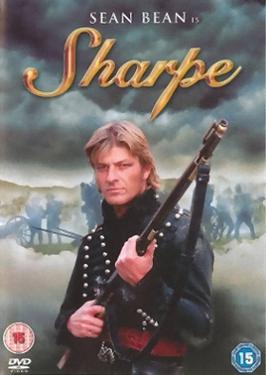
Sharpe is a British television drama series starring Sean Bean as Richard Sharpe, a fictional British soldier in the Napoleonic Wars, with Irish actor Daragh O'Malley playing his second in command, Patrick Harper. Sharpe and Harper are the heroes of the Sharpe series of novels by Bernard Cornwell; most, though not all, of the episodes are based on the books. Produced by Celtic Films and Picture Palace Films for the ITV network, the series was filmed mainly in Crimea, with recordings of other episodes in Turkey, England, Portugal and Spain. The two final episodes were filmed in Jaipur, India.
The South Essex Regiment, later the Prince of Wales' Own Volunteers, is a fictional infantry line regiment in the British Army that was created by Bernard Cornwell in the Sharpe novel series.

Sharpe's Havoc: Richard Sharpe and the Battle of Oporto is the seventh historical novel in the Richard Sharpe series by Bernard Cornwell, first published in 2003.
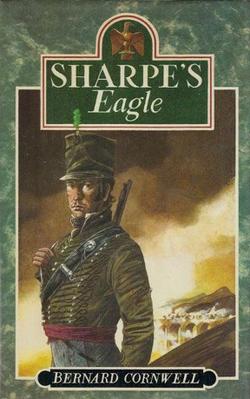
Sharpe's Eagle is a historical novel in the Richard Sharpe series by Bernard Cornwell, first published in 1981. The story is set in July 1809, in the midst of the Talavera Campaign during the Peninsular War. It was the first Sharpe novel published, but eighth in the series' chronological order.
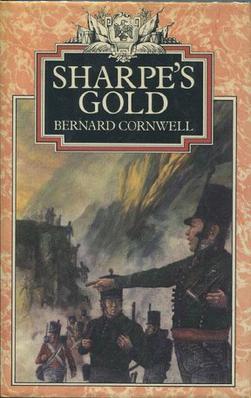
Sharpe's Gold is the second historical novel in the Richard Sharpe series by Bernard Cornwell first published in 1981. The story is set in August 1810 and features the destruction of Almeida during the Peninsular War.
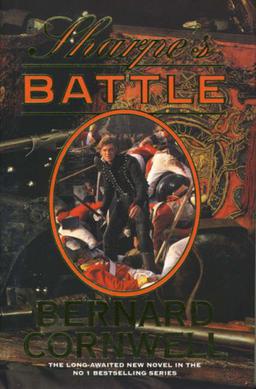
Sharpe's Battle is the twelfth historical novel in the Richard Sharpe series by Bernard Cornwell, first published in 1995. The story is set during the Peninsular War in Spain in 1811.
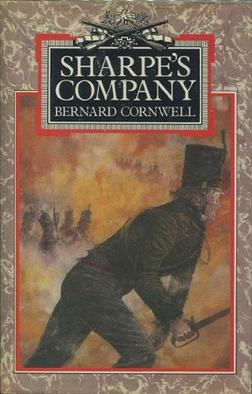
Sharpe's Company is a historical novel in the Richard Sharpe series by Bernard Cornwell, first published in 1982. It was the third in the series to be published, but is thirteenth in chronological order. The story covers January to August 1812, featuring the Siege of Badajoz during the Peninsular War.
The Starbuck Chronicles are a series of historical fiction novels by British author Bernard Cornwell set during the American Civil War. They follow the exploits of Boston-born Confederate officer Nathaniel Starbuck.
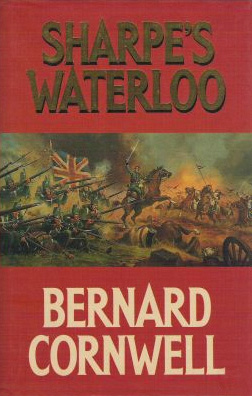
Sharpe's Waterloo is a historical novel in the Richard Sharpe series by Bernard Cornwell. Originally published in 1990 under the title Waterloo, it is the eleventh novel of the Sharpe series and the twentieth novel in chronological order. Cornwell stated that he intended to end the series here, but later changed his mind.
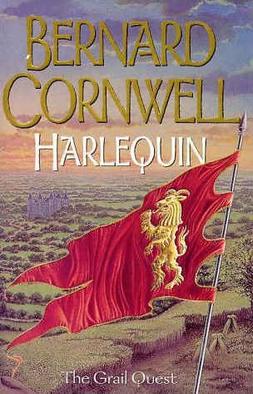
The Grail Quest is a historical fiction novel series written by Bernard Cornwell dealing with a 14th-century search for the Holy Grail, set during the opening stage of the Hundred Years' War.

Sharpe's Challenge is a British TV film from 2006, usually shown in two parts, which is part of an ITV series based on Bernard Cornwell's historical fiction novels about the British soldier Richard Sharpe during the Napoleonic Wars. Contrary to most parts of the TV series, Sharpe's Challenge, as well as the follow-up Sharpe's Peril, is not based entirely on one of Cornwell's novels, but it uses and adapts some characters and storylines from Sharpe's Tiger (1997). Both are set in 1817, two years after Sharpe has retired as a farmer in Normandy, so chronologically they come after Sharpe's Assassin (1815) and before the final novel Sharpe's Devil (1820–21). Some of the events in the film are inspired by events in the first three novels of the series. In Sharpe's Challenge and Sharpe's Peril, Sharpe and his comrade in arms, Patrick Harper, have been temporarily called out of retirement and asked to go to India.
Sharpe's Waterloo is a British television drama, the 14th part of a series that follows the career of Richard Sharpe, a fictional British soldier during the Napoleonic Wars. The adaptation is based on the 1990 novel of the same name by Bernard Cornwell.

Harlequin is the first novel in The Grail Quest series by English author Bernard Cornwell, first published in 2000. The story takes place in the mid-14th century, during the Hundred Years' War.

Vagabond is the second novel in The Grail Quest series by English author Bernard Cornwell, first published in 2002. Set during the first stage of the Hundred Years' War, it follows Thomas of Hookton's quest to find the Holy Grail, a relic which will grant decisive victory to the possessor.

Heretic is the third novel in The Grail Quest series by English author Bernard Cornwell, first published in 2003. Set during the first stage of the Hundred Years' War, the novel follows Thomas of Hookton's quest to find the Holy Grail, a relic which may grant decisive victory to the possessor.

1356 is the fourth novel in The Grail Quest series by Bernard Cornwell, first published in 2012. It is set in 1356, nearly a decade after the original trilogy, and culminates with the Battle of Poitiers. Intertwined in the plot is the quest to find la Malice, a fabled sword of Saint Peter and Christian relic which may turn the tide of the long war for France.

Waterloo: The History of Four Days, Three Armies and Three Battles is a history book written by Bernard Cornwell, first published in Great Britain by William Collins on 11 September 2014, and by Harper Collins Publishers on 5 May 2015 in the United States. It is Cornwell's first work of nonfiction, after publishing more than forty novels in the historical fiction genre, including the popular Richard Sharpe series taking place during the Napoleonic Wars. The book recounts the Battle of Waterloo on 18 June 1815, including preceding events from the campaign of the same name and The Hundred Days.
References
- ↑ "Bernard Cornwell Q&A". www.compleatseanbean.com.
- ↑ "Richard Sharpe bio". The South Essex. Archived from the original on 16 September 2006. Retrieved 22 February 2008.
- ↑ Cornwell, Bernard. "Cornwell's comment on Heretic". Author's Official site. Archived from the original on 27 September 2007. Retrieved 2 October 2007.
- ↑ https://www.facebook.com/bernard.cornwell/photos/a.10150941136705356/10156626030140356/?type=1&theater [ user-generated source ]
- ↑ "The Author's Official site – Sharpe Books dot com". Bernard Cornwell. Archived from the original on 2 September 2011. Retrieved 12 September 2011.
- ↑ Bernard Cornwell. "Waterloo: The History of Four Days, Three Armies and Three Battles". Fantastic Fiction. Archived from the original on 9 July 2014. Retrieved 9 June 2014.
- ↑ HarperCollinsPublishers, "Susannah Kells", Harpercollins, retrieved 8 August 2021